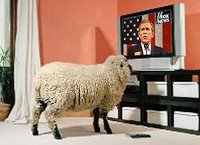[H]e writes the worst English that I have ever encountered. It reminds me of a string of wet sponges; it reminds me of tattered washing on the line; it reminds me of pale bean soup, of college yells, of dogs barking idiotically through endless nights. It is so bad that a sort of grandeur creeps into it. It drags itself out of the dark abysm (I was about to write abscess!) of pish, and crawls insanely up to the topmost pinnacle of posh. It is rumble and bumble. It is flap and doodle. It is balder and dash.
Such imbeciles do not want ideas-that is, new ideas, ideas that are unfamiliar, ideas that challenge their attention. What they want is simply a gaudy series of platitudes, of threadbare phrases terrifically repeated, of sonorous nonsense driven home with gestures. As I say, they can't understand many words of more than two syllables, but that is not saying that they do not esteem such words. On the contrary, they like them and demand them. The roll of incomprehensible polysyllables enchants them. They like phrases which thunder like salvos of artillery. Let that thunder sound, and they take all the rest on trust. If a sentence begins furiously and then peters into fatuity, they are still satisfied. If a phrase has punch in it, they do not ask that it also have a meaning. If a word slides off the tongue like a ship going down the ways, they are content and applaud it and wait for the next.
He concludes:
A tight fabric of ideas would weary and exasperate the audience; what it wants is simply a loud burble of words, a procession of phrases that roar, a series of whoops. This is what it got. 


No comments:
Post a Comment